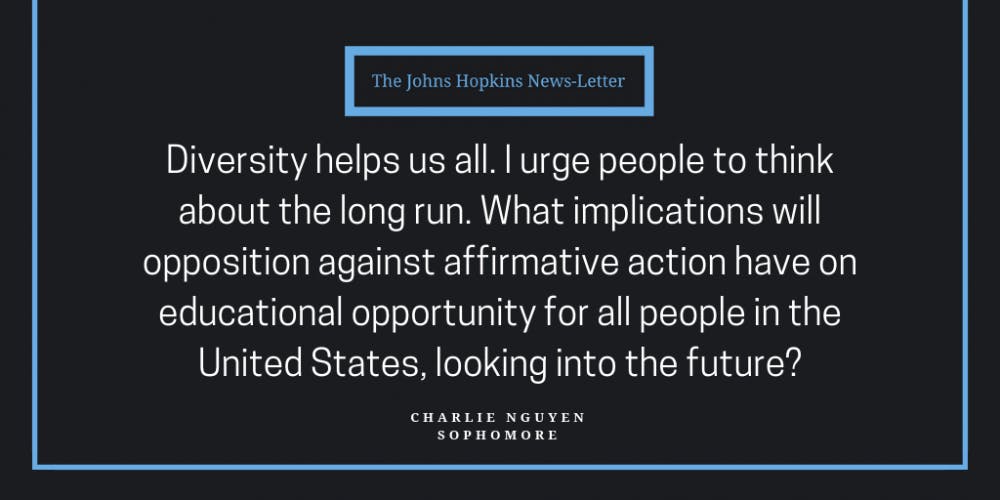Students for Fair Admissions (SFFA), a national anti-affirmative action nonprofit, is currently in the process of suing Harvard University for alleged discrimination against Asian-American applicants in its admissions process.
SFFA is basing its case on Harvard’s race-conscious admissions policy, which allows the university to consider race as a factor in admissions. The organization argues that Harvard has been limiting the number of Asian-American students they admit. SFFA claims that Asian-American applicants are held to higher standards than black and Hispanic students.
Sixteen universities, including Hopkins, have publicly declared their support for Harvard by signing an amicus brief, which is a legal document used to advise the court. The document states that in their holistic admissions processes, these 16 universities seek “a diversity of perspectives, experiences, goals, backgrounds, races, ethnicities, and interests.”
Senior Evelyn Yeh, president of the Inter-Asian Council (IAC) at Hopkins, explained that if SFFA were to succeed, there would be a severe decrease in diversity in higher education.
“A ruling in favor of SFFA would be an attack on affirmative action, which would harm the academic community,“ she said. “[SFFA’s leader] has failed in the past, but if this ruling succeeds, it would be a more concrete hurdle for affirmative action and for marginalized groups of people to get into college.”
Yeh argued that the Harvard trial is being exploited by white supremacists who wish to end affirmative action and are using the Asian-American community as a means to eliminate race as a factor in college admissions.
“Since they can’t directly argue for fairer admissions for white people, they attempt to do that by mobilizing Asians who feel unfairly rejected in the admissions process,” she said.
Yeh identified Edward Blum, the president of SFFA, as one such individual. According to Yeh, Blum exploits other SFFA members — primarily Asian-American students who were rejected from Harvard.
During the trial, Harvard Dean of Admissions William Fitzsimmons asserted that they use a holistic admissions process and consider different factors in determining whether they accept a student. These factors include race, which they consider essential to developing a diverse student body.
In an email to The News-Letter, the Hopkins Admissions Office commented on the lasting impact of the Harvard admissions trial on its current undergraduate admissions.
“At this time, we are not able to speculate about if or how the Harvard case might impact our admissions process. We will continue to watch the ongoing court case and national conversations around this topic. We remain dedicated to serving the mission of Johns Hopkins by bringing in students who will contribute to our diverse campus community,” they stated.
The trial began on Oct. 15 and according to legal analysts, the case will probably be appealed to the U.S. Supreme Court, which could potentially alter admissions processes at universities across the country.
Many other students at Hopkins, including sophomore Charlie Nguyen, expressed concern that a ruling in favor of SFFA would ultimately decrease diversity in the academic community. Nguyen, who is a board member of the Vietnamese Students Association (VSA) said that this trial could negatively affect future college applicants.
“Diversity helps us all. I urge people to think about the long run. What implications will opposition against affirmative action have on educational opportunity for all people in the United States, looking into the future?” he said.
Nguyen further argued that preserving diversity at universities contributes to a holistic academic experience by cultivating a variety of views and cultures on campus. He noted that diversity at Hopkins has been an integral part of his college experience and maintaining diversity is a positive thing for academic institutions.
He also emphasized that Asian Americans are not a homogenous group, so a holistic admissions processes can actually help applicants. Nguyen asserted that Southeast Asians, among other communities, would be hurt if colleges eliminated affirmative action.
“It’s a crucial part of sparking socioeconomic mobility for groups who face structural challenges, especially those of refugee background,” Nguyen said.
Philosophy graduate student Patrick O’Donnell, who teaches the course The Philosophy of Race and Racism, noted that even though the Asian-American rejected applicants may have been discriminated against in the admissions process, this may not have only been because of a systemic issue in Harvard’s application procedures but may instead be an issue with Harvard interviewers.
“It seems this might be two separate issues, whether the race-based admissions policy is a problem versus whether having Harvard graduates interview all your applicants and them having racial biases is a problem,” O’Donnell said.
The trial has revealed that race is not the only thing that can alter a student’s acceptance. Other factors, including whether or not a student is an athlete or the region they come from, can determine whether students of similar academic standing will be admitted.
Currently, Harvard applicants are ranked based on academic qualifications based on a system of one through six, and recruited athletes who scored a four were accepted at 70.46 percent whereas non-athletes were accepted at a rate of 0.076 percent.
Junior Charlie Guan argued that this process was not fair to students. As a recruited track athlete, he recalled looking at the admissions reviews on his application to Hopkins, which students are entitled to do.
“I noticed they marked me as a special athlete. And so even though my admissions counselor recommended to reject me, I was marked as a recruited athlete and then somehow got in,” Guan said.
He noted that these issues broaden the basis of the Harvard trial. He hopes that, in turn, it will only promote fairer college admissions.
“It’s not just race that’s the issue. There’s a lot of categorical bias that I don’t understand, but I hope schools like Harvard revise their decision making process to make it fairer,” Guan said.





